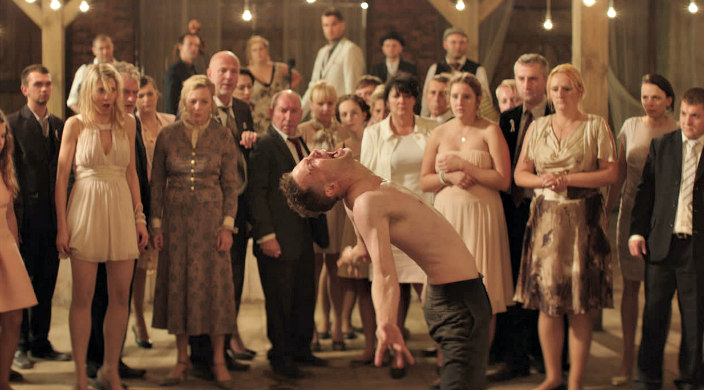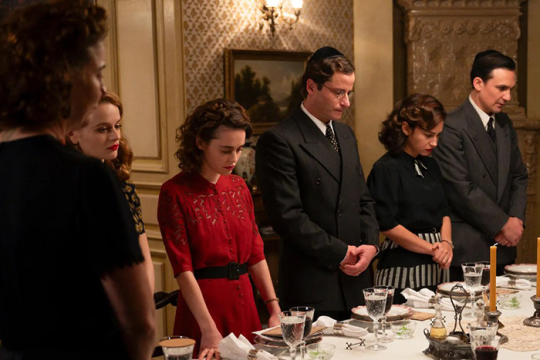
The new film Demon plays on the Jewish folktale of the dybbuk, an evil spirit that possesses a living person, often during a wedding, when the bride and groom are particularly vulnerable (which is why they traditionally wear white). Folklorist and writer S. Ansky popularized the tale in his play about a woman who was possessed on her wedding day by ghost of her intended husband. Ansky died two months before the play made its stage debut in Warsaw in 1920.
In an eerie coincidence, Demon’s director, Marcin Wrona (My Flesh, My Blood, 2009), died in his hotel room just before the film’s official release. He left behind his new wife and producing partner, Olga Szymanska.
In the film, Piotr (played by Israeli actor Itay Tiran) arrives from England to marry his fiancée, Zineta (Agnieska Zulewska) in rural Poland. In preparing the front yard for their wedding party, to be held in the barn of a long-abandoned house, Piotr unearths human skeletal remains. As he tries to conceal his find, a female apparition in a white gown – a dybbuk – peers at him from a distance.
Zineta and Piotr exchange vows in the local Catholic church, and the wedding party heads for the barn to make merry. Visible only to Piotr, the dybbuk enters the room, and, like a vengeful ventriloquist, compels the groom to replace his bride’s name with the name Hana in a speech to the guests. Piotr soon goes into convulsions and is carted off to the house under the supervision of a doctor guest. Zineta’s embarrassed father plies the revelers with booze to keep them happy and clueless as he figures out how to salvage his reputation.
The next words from Piotr’s mouth are in Yiddish: “Gait avek from mein hoise” (Go away from my house). To translate, the doctor brings in the only Jew at the wedding, an elderly professor.
“Who are you?” he asks. The dybbuk replies, “Hana”. The professor informs the doctor that a local woman named Hana, before vanishing without a trace, had been courted by everyone in town, including himself, but loved only one Polish boy. The professor asks the dybbuk, “Why have you taken over this man?” and the voice replies defiantly, “He was my lover, the one I was promised.”
The professor takes Zineta on a drive, pointing out where the tzaddik (righteous rabbi) once read the holy words, where the baker made the best Sabbath challah, where Hana’s three beautiful sisters walked to school. He tells her, “That was…my whole world. Almost nothing is left. Only what’s in the memory.”
On one level, Demon is a dark comedy about a restless spirit crashing a wedding, while the bride’s parents try to pretend that everything’s under control. On another level, it’s about what the famed photographer Roman Vishniac called “a vanished world,” one in which a spiritual realm is very much alive.
I know, because spirits summoned me to Poland in 1993.
I was attending a bar mitzvah party when two Holocaust survivors from my father’s town of Bedzin, Poland asked me if I ever planned to see my family’s prewar home. I said no but asked for the address. Soon afterward, I received an unexpected invitation to join the first official Jewish press tour of post-Communist Poland. I agreed on condition we stop in Bedzin.
After visiting the house, I realized for the first time that no matter how much I shared the emotional burden of my parents, both Holocaust survivors, I could never really know what they’d lived through. At that moment, I felt liberated from an identity that was not rightfully mine; the imaginary number lifted from my arm.
At my urging, our group began looking for the Jewish cemetery. None of the locals we asked knew its whereabouts. We were about to give up when I spotted a masonry arch inscribed with the Hebrew words Beit Olam (indicating a cemetery). Stepping up the pace, I led my colleagues toward the arch – but upon reaching it, I found there were no Hebrew words at all. I apologized, but we nevertheless passed through the portal and soon came upon a steep wooded slope with about 100 Jewish gravestones, many of them slowly succumbing to the inexorable tides of time and gravity.
I could only conclude that it was Poland’s restless Jewish spirits that had beckoned me to return to the land of my forebears and receive their desperate plea: “Do not forget us.”
I traveled to Poland to meet ghosts. You can do it by seeing Demon, in theaters now, to learn of Piotr’s fate.
Related Posts

“We Were the Lucky Ones:” Bringing The Holocaust Out of History Books and Into Our Homes

Eight Unforgettable Jewish Oscar-Winning Movies


